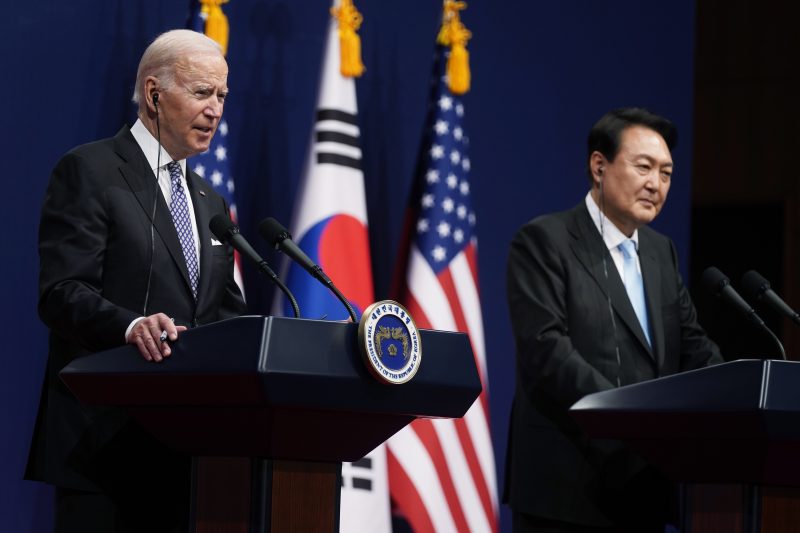President Biden will host South Korean President Yoon Suk Yeol for a state visit to the United States next month, marking only the second such visit of Biden’s presidency as his administration works to counter a bellicose North Korea and build alliances in the Indo-Pacific to push back against a rising China.
The decision to host South Korea over other allies signals the importance Biden has placed on countering North Korea, which has nuclear ambitions, launched an unprecedented number of missile tests and fired long-range missiles into the sea since Biden took office more than two years ago. The U.S.-China relationship is also at its lowest point in decades; Biden has prioritized strengthening alliances in the Indo-Pacific to counter Beijing.
Yoon’s visit is scheduled for April 26 and will include a state dinner, according to White House press secretary Karine Jean-Pierre. The only other leader who has received the pomp and circumstance of a state visit is Emmanuel Macron; Biden has a personal relationship with the French president and has worked with closely him on holding together the Western alliance supporting Ukraine in its defense against the Russian invasion. France is also the United States’ oldest ally and Macron is one of the longest-serving leaders in Europe, whereas Yoon was elected to the presidency one year ago.
Yoon’s visit comes as South Korea this year marks the 70th anniversary of its security alliance with the United States. Since taking office last May, Yoon has drawn South Korea closer to the United States as Seoul grapples with North Korea’s growing nuclear ambitions and China’s rising economic and military strength. Yoon is expected to reinforce the U.S.-South Korean alliance during his visit to Washington.
Yoon faces a South Korean public that is increasingly debating whether they can still trust the United States to protect them in case of war on the peninsula. The shifting geopolitical landscape around South Korea in the past year — the unprecedented number of missile launches from North Korea, Russia’s nuclear saber-rattling and growing fears that China will invade Taiwan — has prompted South Koreans to take a sober look at their security dependence on the United States.
U.S. officials said South Korea’s billions of dollars of economic investments in the United States — including from major corporations such as Samsung, SK Group and Hyundai — played a key role in the decision to invite Yoon and his wife, first lady Kim Keon Hee, adding that such investments will help strengthen each countries’ supply chains. A senior administration official noted that such technology investments used to go to China.
“President Biden’s investment in the U.S.-Republic of Korea alliance has been game changing for our economic and national security — and for strengthening deterrence and advance peace and stability in the Indo-Pacific region and around the world,” Jake Sullivan, Biden’s national security adviser, said in a statement. “The United States’ commitment to the Republic of Korea is ironclad.”
Biden officials also noted South Korea’s support of the administration’s position on Ukraine. Seoul has condemned Moscow, imposed financial sanctions and export controls on Russia and sent humanitarian assistance to Ukraine.
Yoon’s visit to the White House will be his first as president, and is expected to be a major diplomatic event for the political novice. The former top prosecutor of South Korea made his first run at politics when he ran for the presidency. He won the 2022 election with the narrowest margin in South Korea’s democratic history, and faces a divided electorate largely skeptical of his leadership skills. In recent weeks, he has found some stable footing in his approval ratings, which are hovering around 40 percent.
The Biden administration has also worked to strengthen the relationship between South Korea and Japan — an issue that is likely to be discussed during the visit — arguing that such a relationship will only help counter aggressive actions from North Korea and China.
Yoon’s administration is taking politically divisive steps to mend ties with Japan, which colonized the Korean Peninsula from 1910 to 1945. Seoul’s relations with Tokyo hit a low in 2018 after court rulings relating to a contentious issue over wartime forced labor. But Yoon has made overtures to Japan with the support of Washington, which is keen for its two strongest allies in Asia to improve relations.
Yoon — who has taken a harder line toward the North than his predecessor — has sought to show that Seoul is cooperating with Tokyo and Washington in hopes that stronger diplomatic and security cooperation among the three might help Seoul counter Pyongyang and Beijing.
While Yoon has acknowledged the debate in his country over whether South Korea should acquire its own nuclear weapons, he has emphasized Seoul’s relationship with Washington and the U.S.-South Korean alliance as key to maintaining peace on the Korean Peninsula.
Just two weeks into his term last May, Yoon made his debut on the global stage when Biden visited Seoul during his trip to Asia, which presented Yoon’s first leadership test: forging a relationship with the leader of South Korea’s most powerful ally. Yoon has little foreign policy experience, whereas Biden spent years in the Senate Foreign Relations Committee and took the lead on many global issues while serving as vice president under Barack Obama.
As president, Biden has prided himself on his decades of experience in foreign policy and the strong relationships he has with global leaders.
During their first state dinner in Seoul, the two men bonded over their pets and their families, the South Korean presidential office said. Since then, the two men have met at other global events and multilateral summits. Each encounter with Biden has drawn intense attention from the South Korean public — from how long they spoke to what Yoon’s demeanor was like, especially in comparison to Biden. The state visit is likely to get as much attention and scrutiny in South Korea.
Lee reported from Seoul.

